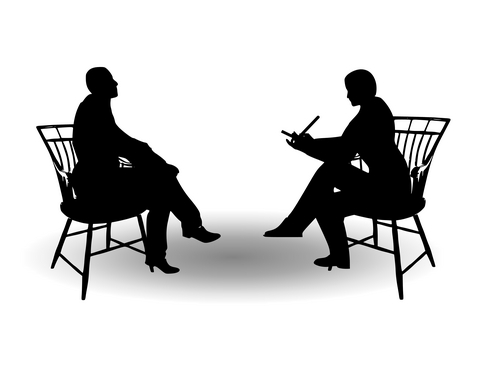50% of all advertised receptionist job positions are part time roles?
This is due to the large scale of reception jobs. With positions being able in a number of job sectors, from education to construction, from finance to the health sector.
Receptionist jobs are advertised throughout the world, with various salaries and responsibilities, depending on the job sector the receptionist role is being advertised in.
How competitive is a receptionist job interview?

Interview Specifics:

Can you demonstrate the relevant knowledge and experience to pass a receptionist job interview?
- How to greet visits in a professional manner
- Data inputting, using a variety of IT skills
- The process for allocating security passes
- Answer enquiries in person, by phone and email
- Experience of booking systems
- Administrational skills and experience
- Knowledge of GDPR
Check the average pay for a receptionist job role.
Below is a list of commonly asked job interview questions for a receptionist role.
Each summary comes with an explanation of the interview question and an example interview answer.
It is important to tweak each interview answer template, making it relevant to the interviewee’s own skills, qualities, experience, and knowledge.
An interviewer’s perception of a job applicant, their interview identity, is made up of the interviewee’s perceived level of knowledge/experience vs their level of confidence during the recruitment process.
The first stage, when preparing for a job interview, is to recognize your own ‘interview identity’.
Job Interview Questions and Answers for a Receptionist
Prior to the official job interview, the panel of interviewers (often 3 staff members, including a direct line manager) will make small talk to help relax the interviewee.
The hiring manager will start the interview by explaining the process of the structured job interview.
Including, the number of questions that will be asked, who on the interview panel will ask which questions, and how the applicant can ask for a question to be repeated.
They will go to explain the post-interview details; when each candidate will be told if they have been successful or not.
The job applicant, who prior to the recruitment day has made ample preparation, is expected to answer the questions by showcasing how they meet the job criteria.
Tell me about your experience working as a receptionist, and what you can bring to the team?
The opening question for a receptionist interview is always an open-style interview question.
The question may be framed slightly differently:
- “What is your understanding of a receptionist duties?”
- “Why did you apply for a receptionist job role within our company?”
- “How does your work experience apply to this position?”
All opening questions, compared to the forthcoming more specific interview questions, allow an applicant to choose how the answer the question.
This ‘choice’ can result in a clever interviewee focusing their answer on their own unique selling point, what they can bring to the team and how they fulfill the job criteria.
It is important, therefore, to be aware of the three rules for a successful job interview.
In short, the initial question is designed for the employer to gain a general overview of the applicants suitable for the receptionist job role.
Start the interview answer with a standout point that will create interest:
- A long duration in the industry, as time served is associated with talent: “I have worked as a receptionist for over 12 years…”
- A required but rare skill to create interest: “One of my key skills is my ability to (add rare skill)….”
- A reference to the industry the receptionist job role is in, which highlights sector knowledge and understanding: “Throughout my career I have always worked in (sector), throughput this time I gained the knowledge to (industry related receptionist task)…”
Next, be more generic list other receptionist duties, being detailed on any duties that the applicant is highly skilled in:
“I have a wide range of experience working as a receptionist and in administrational roles which include: diary management, making appointments over the phone, data inputting, customer service, and in my last role I led on (highly skilled task) where I (add detail)…”
End the interview answer, with a short summary:
“To summarize, I have X number of years and experience and my skill includes A, B, and C.”
What is your knowledge of ITC systems?
In an article on Indeed, they state the following ITC skills are commonly required:
- Analytics
- Social media
- Graphic design
- Microsoft Office
- Spreadsheets
- Email communication
- Marketing automation
- Data visualization
For certain sectors a particular database may be commonly used, requiring the job applicant to not only be aware of the database but to reference the specific database tasks during the interview answer.
An example is the use of ‘Sims’ in schools or ‘autocad’ in civil engineering.
The ITC question is asked for two reasons, to confirm the interviewee has a basic understanding of ITC systems, including emails, excel, word documents. And, more importantly, any specific sector-related ITC systems.
To answer the technology question, start generic and become more specific, highlighting awareness of the applicant’s level of industry ITC systems and products.
“I am very skilled in a range of ITC skills, including the basics, excel, word, publisher. In fact, my level of (IT system) is above average – I am able to (add specifics details). Because I have worked in the sector for X number of years, I am fully conversed with (sector-related ITC system). I have experience of (add ITC system duties).
An example of this, was when I worked at X organization. We were tasked to X. Because of my knowledge of (ITC system) I personally (action taken) which resulted in (outcome).”
What would you do if the computer system failed?
Most offices are becoming paperless, with digital documents replacing paper, and storage cupboards becoming obsolete as businesses move to storing information in the cloud.
The risk, therefore, is system failure.
Employers need receptionist staff to be able to pro-actively respond to difficult ITC situations.
ITC system failure questions may be more specific depending on the sector the advertised receptionist job role is in:
- “How would you gain customer information if the database crashes?”
- “How do you recover lost documents in Word?”
- “How do you backup databases to prevent loss of information encase of a hack?”
The best way to answer the specific ITC question is via a real-life example. Stating a past experience highlights the skills the applicant possesses to deal with the stated problem.
“This has actually happened to me. While working at X organization, I arrived early one day in the office to find that (ITC failure). The timing was terrible, as the company had (a deadline, audit, inspection, customer/client meeting, etc).
My manager was stressed and nobody had any idea what to do.
Because of MY excellent ITC skills, I was able to (add actions taken).”
Give me an example of dealing with an awkward customer?
A key task for a receptionist is taking a customer or client’s phone calls, responding to emails, signing for office deliveries, making/confirming appointments, communicating face to face, and screening external stakeholders who are requesting meetings with senior staff members.
This task requires various skills:
- Communication
- Listening
- Assertiveness
- Confirming
- Professionalism
Customers become ‘awkward’ or frustrated due to many reasons:
- Feeling unwell – this especially important to understand in NHS receptionist roles
- Having previously trained to get through to a certain person time and time again
- Time constrictions – commonly happens with delivery drivers
- A customer with a complaint/unhappy customer
- Stressed/anxious/annoyed
Start the interview answer, by explaining the reasons a customer or client would be awkward or annoyed (relating to common industry problems).
Follow the opening statement by giving an example of what you would do if a future customer was being awkward.
“In our industry customers can become awkward when X, Y, and Z happen.
In this situation, the best course of action is to remain professional, polite, and to listen to any complaint. It is also important to understand the customer’s point of view and to find common ground. This is because an annoyed customer may leave bad reviews online which could affect the image of the company.
An example of helping an awkward customer is when I was working at X company as a (job role). A customer was (complaining/being angry/being awkward) because (reason).
First, I listened to the complaint without interrupting, as it’s important to let me let the anger out. I then asked specific questions to understand the situation without making assumptions.
I then asked what was the best way to resolve this and shared the options I was able to do there and then. This helped the customer to relax as they felt they were being listened to and supported, resulting in (positive outcome).”
What information would you take from a client who is looking to book an appointment?
Accuracy is key for a receptionist job role.
The specific interview question around what information to take from a client appointment booking could easily be asked for a number of receptionist job duties:
- “How would you confirm a meeting request?”
- “In what way would you ensure the accuracy of a data inputting task?”
- “When speaking to a customer on the telephone what information do you need to take?”
A receptionist is often the first point of call, an information receiver, and giver, and often for many businesses the gatekeeper – deciding which persons get put through to senior staff members, and which don’t.
It is the information gained that allows the receptionist to the decision of who speaks to who. The wrong decision can result in either, an annoyed senior staff member due to having their time wasted or an outraged stakeholder for not being let through the ‘gate’.
To answer the ‘information’ interview question, state the required steps, specifying what information is needed:
“I am highly experienced in booking client appointments. When a client telephones for an appointment I first check who the client is; their name, DOB, and address. Requesting the DOB and address is a check to ensure that the person calling is the client and not a fraud caller.
Next, I check the reasons for the appointment. And the availability of the department. Once a date and time have been agreed, I would send a reminder to each of the appointment attendees via email.
This strategy ensures the accuracy of the appointment and reduces any errors.”

How would you arrange your working day?
Receptionists either work within a small team of receptionists (commonly seen in the healthcare service) or on their own initiative (receptionist in a small office).
Either way, the receptionist has to manage their own workload.
The time management question is really asking – how do you prioritise your workload?
For each receptionist, there will be a list of regular daily and/or weekly tasks, plus additional ad-hoc duties that randomly pop up depending on workload.
When answering the interview question: how do you arrange your day (or workload). Split the interview answers into two sections – regular tasks and ad-hoc duties.
“Each day is different. Generally speaking, I will have a set of regular tasks; checking emails, confirming appointments, updating finance information, taking phone call,s and completing a range of administrational tasks.
For these duties, I prioritise each task depending on the level of urgency and importance. As all these tasks happen weekly, I can easily split each task over a period of a week.
In addition, throughout my working week, new urgent tasks will land on my desk. This could include the month-end finance report that needs double-checking, or an influence of customers due to a new promotion.
When new ad-hoc tasks present themselves, which are urgent, I will delegate some of the regular duties to other staff while I prioritise the new job which often has a short deadline.”
Give an example of being GDPR compliant?
GDPR is a fairly new regulation that has a large impact on the responabilities of receptionists.
Therefore, it is important for receptionists to familiarize themselves with the GDPR regulations in preparation for a job interview.
Most employers will deliver GDPR and data protection training for all new recruits. For the job interview, hiring managers want to ensure that the successful interviewee has enough awareness to not breach the GDPR regulations.
In the interview answer cover the following 3 points:
- GDPR Training
- Daily actions taken not to breach GDPR
- Any additional knowledge
“Due to my previous roles requiring me to handle sensitive personal data I have undertaken a range of GDPR and data protection training.
I am fully versed in (add GDPR regulation related to the sector you are in)
On a daily basis, I follow GDPR by ensuring that all personal data is kept in lockable cabinets, using unique passwords on the various IT systems, and locking my computer when I’m away from my desk.
Because in our (sector) we deal with (sector-related sensitive data) I am also aware of the need to (add actions relating to the sectors sensitive data)”

Do you have any questions for me?
Each hiring manager during all job interviews will ask each interviewee if they have any questions for the employer.
Knowing that the final ‘ask me’ question will be asked, a set of questions needs to be prepared.
- How many staff members work in the reception area?
- What percentage of the job is customer facing?
- What does an average do look like?
- Why do you like working for X company?
- What CPD is on offer for new staff members?
This site uses the ‘LMI for All’ online data portal to access official government ‘big data’ sources. This powers the labour market data provided on this site.








